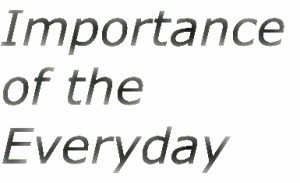The importance of the everyday
 Through our professional careers and even our own personal experiences, our team has been privy to a gamut of injuries from sprains and strains, to broken bones and “slipped discs”, among many others.
Through our professional careers and even our own personal experiences, our team has been privy to a gamut of injuries from sprains and strains, to broken bones and “slipped discs”, among many others.
Over the last few years working in the sports performance, fitness and injury rehabilitation industries, we’ve noticed something quite different than what we would have expected: the vast majority of the people that come through our clinic doors don’t have a sudden acute injury.
It’s true.
Most of these people didn’t have an immediate trauma that started their pain and problems: no one took them down in a crushing tackle; they didn’t fall down the stairs.
That’s not to say that there wasn’t an event that set it off.
In fact, quite a few of these individuals do recall a specific incident where things started to go downhill fast. However, their injury history actually tells quite a different story. If probed enough, most of them can remember multiple episodes of low back pain or multiple occurrences of spraining their ankles before the “noted injury”, the tipping point, if you will.
And that’s what brings us to the importance of the everyday.
This is probably the most valuable lesson we attempt to impart on our clients. It’s the one major piece of knowledge we try to pass along to them with every visit, and truly make sure that they understand why it has such a huge impact on their health, fitness, and ultimately happiness.
It’s quite often your repeated everyday activities that injure you over time or that will keep you in pain.
Restated, the above simply means that there’s something that you do as part of your daily activities that continues to irritate or injure your tissues or body structures, leading to pain and loss of function.
If you could remove or modify that specific irritation, your body would be given the opportunity to do what it does best, heal.
If you’re eating well, getting enough rest, and exercising properly, your body has all the tools and resources it needs to start fixing what is broken.
The challenge now is to figure out what is causing you the problem in the first place. And then remove it.
Yours in movement.
Team Primal
(inside Peak Performance Golf)